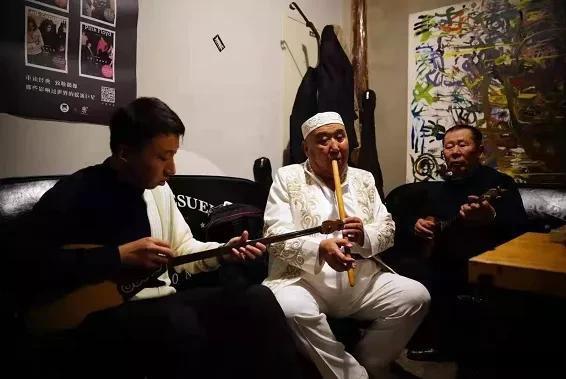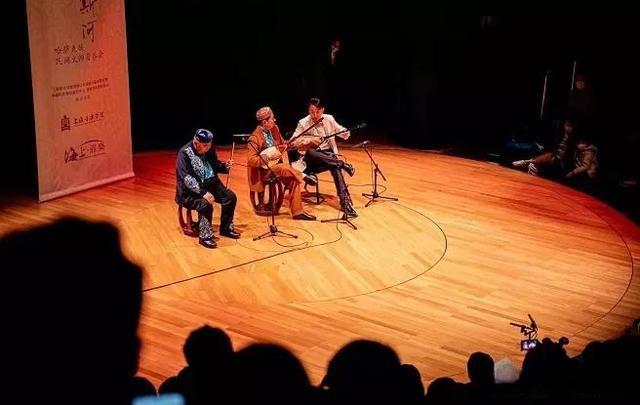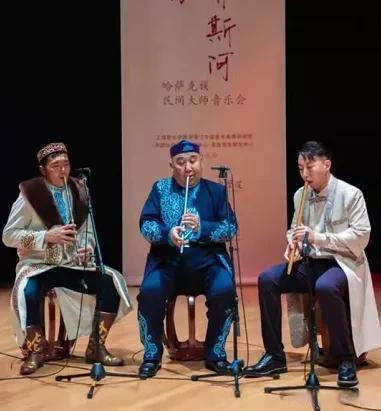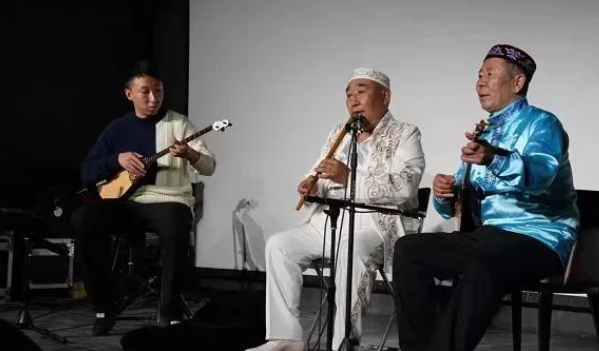"The Voice of Kazakh" in the eyes of Kubuzi musician Zhang Shan
Zhang Shan, a doctoral student of music anthropology at Shanghai Conservatory of Music, spent more than 6 years immersed in the Kazakh pastoral areas of Xinjiang, studying, researching and arranging Kazakh folk music, and disseminating grassland music to the outside world. charm.

When he was a university student at the China Conservatory of Music, Zhang Shan participated in the collection and filing of Xinjiang Kazakh folk music repertoire. Folk artists such as Hali Akbar, Milan Buick Ahesai and Rehati Saitihan learn traditional instruments such as dongbra, sbuzie, kouxian and kubuzi, as well as the singing of tilmai (folk songs) .
On the first day of the Lunar New Year in 2017, Zhang Shan came to Qinghe County in the Altay region of Xinjiang for the first time, chasing the snow against the wind, just to visit the Xinjiang Dongbula master Sayilaxi Galmuhamati.

"At that time, I recorded two pieces of Dongbula music by Teacher Shaylashi. At that time, I didn't understand Kazakh language, and I was obsessed with one of the pieces. After I went back, I listened to that piece repeatedly, and at the same time groped on Dongbula, using I played that piece for a whole year." Zhang Shan introduced that during that time, he would hold Dongbula when he was eating, watching a movie, or reading a book. Once he was free, he would listen to the recording to explore, and waited later. When he played it, he learned that the song was called "White Waves".
Zhang Shan later learned that many Kazakh musicians in Xinjiang used to listen to the Dongbula music from radio programs when they were young. Through this traditional way of learning music, his fieldwork had depth and connotation, and he also learned Dongbula by learning Dongbula. The way to learn the playing of Sbuzi'e and Kubuzi.

In 2019, Zhang Shan came to Urumqi County to learn to play with the master of Sbuzi'e, Bailihan Hali Akber. Ordinary people need half a year or even a year to play the Spuzzier, he played a complete repertoire in two weeks, and was praised by his teacher, saying that he had a magical fate with this instrument.
"Before doing fieldwork, I had listened to more than 300 songs about Sbuz'e, and I recorded them after listening, which means that before I went to Xinjiang to study Sbuz'e, I would memorize all of these more than 300 songs. This is the reason why I quickly mastered it when I studied with the teacher later." Zhang Shan said that the accumulation of a large number of music libraries made him think a lot about the composition of the music of Spuzie, and these thoughts also opened his eyes to him. A golden key to the world of Kazakh folk music.
Back in Shanghai, Zhang Shan felt that his heart was still in Xinjiang. He often played the Kazakh song "awel deng keshe" with his master Rehati Saiti Khan over a WeChat video, which was an emotional connection between master and apprentice.
Zhang Shan said: "The teachers' oral and heart-to-heart teachings have enabled me to have the current research results. I hope more people can pay attention to Kazakh folk music, and Kazakh music is full of thoughts on life and nature. It has great implications for our contemporary society.”
After half a year of preparation, on November 5, 2021, a folk master concert titled "The Waves of the Irtysh River" will be held as scheduled. More than 300 Shanghai audiences who were present enjoyed Dongbula, Sbuz'e and Kubu. A feast of folk music played in unison by Kazakh traditional instruments such as zi and kouxian.

That night, Zhang Shan and 6 folk artists from Xinjiang, including Sayilaxi Galmuhamati, Bailihan Khali Akbar, and Rehati Saitihan, played 13 traditional music.
This is not the first time that Kazakh folk music has appeared on the stage in Shanghai. What is different from the past is that the program list of this concert is accompanied by the story introduction of the work, so that the audience can start thinking about Kazakh folk music. journey of.
Zhang Shan said: "The theme of the concert is "The Waves of Irtysh". Usually, such a title is reminiscent of natural scenery. However, this song is a metaphor for the ups and downs of life. It is difficult for Kazakh music to simply From the association of the title to the philosophical connotation to be presented behind it, it is necessary to have a deep understanding of the background of the repertoire, which is also what I learned through fieldwork.”

Zhang Shan said: "I don't want the audience to listen to the concert with a curious mind, but through the live performance and the story behind the music, a complete understanding of folk music can be gained from the concert."
"I was in Altay for a wedding, and at the dinner party, I played Dongbra, Sbuzie and Kubuzi to my companions. I like this feeling very much, because I have integrated into the local life, which is in the Shanghai can’t feel the joy.” Zhang Shan said that now, he only needs to listen to the music played by the musicians once, and he can play with the musicians the second time.

When Zhang Shan was doing field research, she used this traditional method to find out the music score on Dongbula, which also opened the door to folk music.
In the past two years, Zhang Shan has opened Dongbula training classes for local youths in Shanghai. She has also introduced Kazakh folk music to more than 3,000 children in Shennongjia, Hubei Province through online teaching.
This is just Zhang Shan's initial practice. Next, Zhang Shan wants to use the research results of Kazakh folk music to make teaching materials. Through the practical activities of learning ethnic musical instruments, children from all over China can learn about the culture behind them through the study of music.
Zhang Shan said: "For a long time, Kazakh folk music has been passed down in the way of 'old and new'. I am gratified that more and more young people are now joining the folk music scene with fiery emotions. In inheritance and research, these things cannot be completed in a few years, and need to be passed down from generation to generation, and this behavioral process can affect more music lovers.”
 渝公网安备 50010702504639号
渝公网安备 50010702504639号